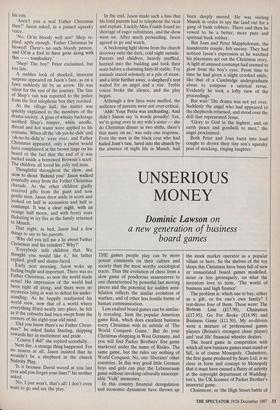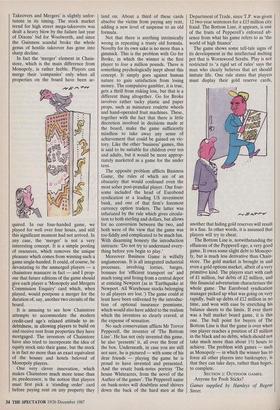UNSERIOUS MONEY
Dominic Lawson on
a new generation of business board games
THE games people play can be more potent comments on their culture and society than the most worthy sociological tracts. Thus the evolution of chess from a slow game of ponderous manoeuvres to one characterised by powerful fast moving pieces and the potential for sudden anni- hilation reflects the similar evolution of warfare, and of other less hostile forms of human communication.
Less exalted board games can be similar- ly revealing. Item the popular American game Risk, which does excellent business every Christmas with its subtitle of 'The World Conquest Game.' But do your Christmas shopping in West Germany, and you will find Parker Brothers' fine game marketed under the name of Risiko. The same game, but the rules say nothing of World Conquest. No, one 'liberates' other countries. In this way good little German boys and girls can play the Lebensraum game without invoking culturally unaccept- able 'Volk' memories.
In this country financial deregulation and economic dynamism have thrown up the stock market operator as a popular villain or hero. So the shelves of the toy shops this Christmas have been full of new or resuscitated board games modelled, more or less grotesquely, on what the inventors love to term, 'The world of business and high finance'.
The problem is: which one to buy, either as a gift, or for one's own family? I test-drove four of them. These were: The Bottom Line (£17.99), Chainstore (£17.95), Go For Broke (£14.99) and Business Game (£11.50). My co-drivers were a mixture of professional games players (Britain's strongest chess player) and 'real life' financial wheeler dealers.
The board game in competition with which all new business games must stand or fall, is of course Monopoly. Chainstore, the first game produced by Sears Ltd, is so close in form and concept to Monopoly that it must have caused a flurry of activity at the copyright department of Wadding- ton's, the UK licensee of Parker Brother's immortal game.
Chainstore, or 'the High Street battle of Takeovers and Mergers' is slightly unfor- tunate in its timing. The stock market trend for high street mega-takeovers was dealt a heavy blow by the failure last year of Dixons' bid for Woolworth, and since the Guinness scandal broke the whole genus of hostile takeover has gone into sharp decline.
In fact the 'merger' element in Chain- store, which is the main difference from Monopoly, is rather feeble. Players can merge their 'companies' only when all properties on the board have been ac- quired. In our four-handed game, we played for well over four hours, and still this significant moment had not arrived. In any case, the 'merger' is not a very interesting concept. It is a simple pooling of resources, which removes the unique pleasure which comes from winning such a game single-handed. It could, of course, be devastating to the unmerged players — a chainstore massacre in fact — and I prop- ose that future editions of the game should give each player a 'Monopoly and Mergers Commission Enquiry' card which, when played, would postpone a merger for the duration of, say, another two circuits of the board.
It is amusing to see how Chainstore attempts to accommodate the modern credit-card age's relaxed attitude to in- debtdness, in allowing players to build on and receive rent from properties they have mortgaged. The inventors of Chainstore have also tried to incorporate the idea of equity stock into their game, but the stock is in fact no more than an exact equivalent of the houses and hotels beloved of Monopoly players.
One very clever innovation, which makes Chainstore much more tense than its predecessor, is the notion that players must first pick a 'standing order' card before paying rent on any property they land on. About a third of these cards absolve the victim from paying any rent, adding a new level of suspense to an old formula.
Not that there is anything intrinsically wrong in repeating a trusty old formula. Novelty for its own sake is no more than a gimmick. This is the problem with Go for Broke, in which the winner is the first player to lose a million pounds. There is something psychologically inept about this concept. It simply goes against human nature to gain satisfaction from losing money. The compulsive gambler, it is true, gets a thrill from risking loss, but that is a different thing altogether. Go for Broke involves rather tacky plastic and paper props, such as miniature roulette wheels and hand-operated fruit machines. These, together with the fact that there is little discretion involved in decisions made at the board, make the game sufficiently mindless to take away any sense of achievement that could be gained on vic- tory. Like the other 'business' games, this is said to be suitable for children over ten and adults, but it would be more approp- riately marketed as a game for the under tens.
The opposite problem afflicts Business Game, the rules of which are of an obscurity that would confound even the most sober post-prandial player. Our four- some included the head of Eurobond syndication at a leading US investment bank, and one of that firm's foremost currency option traders. The latter was infuriated by the rule which gives circula- tion to both sterling and dollars, but allows for no conversion between the two, and both were of the view that the game was too fiddly and complicated to be much fun. With disarming honesty the introduction instructs: 'Do not try to understand every- thing before you begin to play.'
Moreover Business Game is wilfully unglamorous. It is all integrated industrial processes, involving lorries, barges, bonuses for 'efficient transport on' and much toing and froing from a central depot at enticing Newport (as in 'Earthquake at Newport. All Warehouse stocks belonging to all players are lost.') The game could at least have been enlivened by the introduc- tion of optional insurance premiums, which would also have added to the realism which the inventors so clearly craved, at the expense of sensation.
No such conservatism afflicts Mr Trevor Pepperell, the inventor of 'The Bottom Line'. He has not only invented this game, he also 'presents' it, all over the front of the box. Underneath, in case you are still not sure, he is pictured — with some of his dear friends — playing th9 game he is proud to have invented and presented. And the ersatz bank-notes portray 'The house Whiteacres, from the novel of the Author of the games'. The Pepperell name on bank-notes will doubtless send shivers down the back of the hard men at the Department of Trade, since T.P. was given 12 two-year sentences for a £15 million city fraud. The Bottom Line, it appears, is one of the fruits of Pepperell's enforced ab- sence from what his game refers to as 'the world of high finance'.
The game shows some tell-tale signs of its development in the intellectual melting pot that is Wormwood Scrubs. Play is not restricted to 'a rigid set of rules' says the man who clearly believes that art should imitate life. One rule states that players must display their gold reserve cards, another that hiding gold reserves will result in a fine. In other words, it is assumed that players will try to cheat.
The Bottom Line is, notwithstanding the effusions of the Pepperell ego, a very good game. It owes some slight debt to Monopo- ly, but is much less derivative than Chain- store. The gold market is brought in and even a gold options market, albeit of a very primitive kind. The players start with cash of £1 million, but debts of £2 million, and this financial adventurism characterises the whole game. The Eurobond syndication manager picked up what was going on very rapidly, built up debts of £12 million in no time, and won with ease by stretching his balance sheets to the limits. If ever there was a bull market board game, it is this one. The bull point for buyers of The Bottom Line is that the game is over when one player reaches a position of £5 million in the black and no debts, which should not take much more than about 11/2 hours to achieve. The problem with games — such as Monopoly — in which the winner has to force all other players into bankruptcy, is that they can take days, rather than hours, to complete.
SECTION 2: OUTDOOR GAMES.
Anyone for Pooh Sticks?
Games supplied by Hamleys of Regent Street.











































































































 Previous page
Previous page